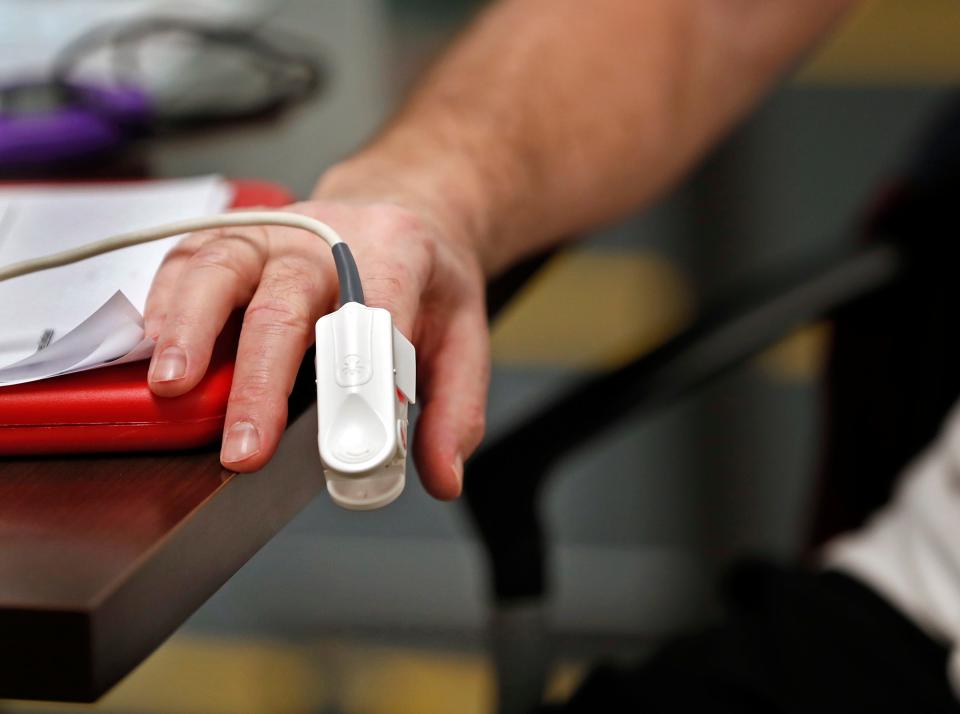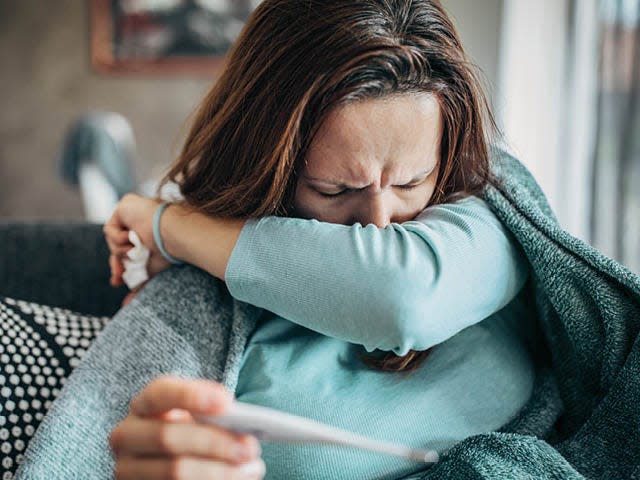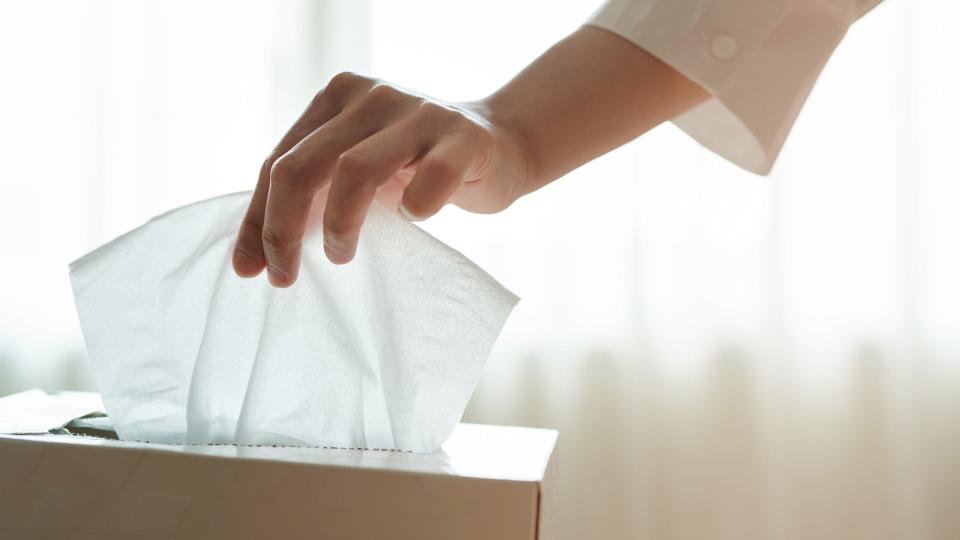COVID at home: What do I need, doc? What do I do? When do I go to the ER?
The sore throat won't quit, you have chills and a cough and a fever. Like countless others across the nation who have tested positive, you have become a COVID-19 omicron variant patient. You know what to do: Stay home.
But what will you need at home while you're sick? And how will you know whether you're sick enough to have someone get you to the hospital?
The Enquirer asked several Cincinnati area doctors who have been treating hundreds of patients with COVID-19 for their recommendations.
Here's who we asked:
Dr. Thomas Lamarre, infectious disease specialist at the Christ Hospital Health Network.
Dr. Mary Carol Burkhardt, associate division director for primary care at Cincinnati Children’s Hospital Medical Center and medical director of the Hopple Street Health Center.
Dr. Imran Naqvi, vice president of medical affairs at the Jewish Hospital – Mercy Health.
Dr. Barry Wendt, an internist at St. Elizabeth Healthcare.
Here's what we asked and what they said.

Should I have a pulse oximeter?
These devices are placed on a finger for oxygen level readings. The doctors we asked about them had varying responses about their necessity.
Lamarre: "Monitoring your oxygen level is a very important part of managing COVID-19 at home. Using a home pulse oximetry device is strongly recommended, If you do not have one, your physician ... will likely be able to assist you. Normal home oxygen level should be above 94% (at rest). If levels are below this you should promptly call your physician or provider."
Burkhardt: "For most healthy children, it is not necessary to have a pulse oximeter at home. Readings can occasionally be challenging to take, and many commonly found pulse oximeters bought at stores or online are not designed for children – so can give inaccurate readings.
"Instead, if you have concerns about your child’s oxygen level, you need to contact a medical provider."
Wendt: "If you have a respiratory disease or condition," have one at home. Ask your doctor if you aren't sure whether to get one.
Naqvi: "It's a good idea to have one."
The U.S. Food and Drug Administration notes that there are limitations to the devices. "Multiple factors can affect the accuracy of a pulse oximeter reading, such as poor circulation, skin pigmentation, skin thickness, skin temperature, current tobacco use, and use of fingernail polish."
FDA tips include using according to manufacturers' instructions. Keep your arm below your heart when testing oxygen levels. Test on a warm and relaxed hand. Remove nail polish first.

Should I stay in a separate room? Do I need masks?
Wendt: "If possible, have a room separate from everyone else and isolate there."
"Wear a mask if others are there. Have masks for others. Have N95s for those who are caring for you if at all possible."
Lamarre: "Masks should be worn around others at home, and if you can’t wear a mask because of trouble breathing, for example, cover your mouth when you cough and sneeze. Medical grade surgical masks are recommended and are much more effective than cotton or homemade masks."
"Staying at least 6 feet away from others and trying to isolate in a separate room of the house and use a separate restroom are also helpful to protect your loved ones."
Burkhardt: "If a child gets COVID, it is important to keep them isolated. This is challenging in many households, especially with young children who need care and supervision. Infected children should not be in public. If (you're) unable to keep the child separated from other household members, using masks inside can provide some protection. Ideally, keep the infected child separated from other household members and using a separate bathroom if possible."
What do I need to stay hydrated?
Wendt: "Get electrolyte-sports drinks, such as Gatorade or Pedialyte." Drink at least two 20-ounce bottles of these a day and drink plenty of water, too, "so that you’re not ending up dehydrated."
Naqvi: "Make sure you have plenty of fluids on hand. You get dehydrated as a result of an infection. Do what you can to have adequate amount of fluids at home so you can keep hydrated. Drink whatever you enjoy."
Burkhardt: Most important is to keep your child hydrated and comfortable. "I would also recommend having oral hydration solutions, for example, Pedialyte, to help keep a child hydrated when they are not eating and drinking typically."
Do I need someone else around? I'm an adult.
Lamarre: "It is important if possible to have someone at home help monitor you to observe for worsening signs or symptoms.

How do I know if I should go to the ER?
Burkhardt: "A child should see a medical provider for worsening breathing, wheezing, chest pain, decreased urine output and worsening fatigue. Start by calling your pediatrician for direction on what to do if you have concerns about your child. If your child is struggling to breathe and is in respiratory distress, they need to be seen right away."
"Thankfully, most children can be cared for at home with COVID-19 and do not need to seek additional medical care."
Lamarre: "Emergency warning sides for progressive or severe COVID-19 include trouble breathing, persistent pain or pressure in the chest, new confusion, inability to stay awake, pale, gray- or blue-colored skin, lips or nail beds or severe vomiting, diarrhea or inability to eat or drink. These symptoms should prompt a call to your physician or provider or 911 and signal that you need to be evaluated by a healthcare provider."
"Stay in touch with your physician or provider. If you have questions or concerns, bug them! They are there to help."
Naqvi: "Any time you start having difficulty with breathing, become short of breath or experience chest discomfort, go to the ER. If you or your loved one who has COVID has a history of blood clots, know that COVID-19 does increase your risk of developing life-threatening blood clots, especially if you have had a prior blood clot. Even in the absence of COVID symptoms, if you notice swelling in your legs or experience shortness of breath, you need to be seen by a physician."
Wendt: "Our ERs and urgent cares are overwhelmed now with cases. They’ve cut back somewhat on routine care, expanded video visits. If you really just have mild symptoms stay home." Use MyChart for any questions. "I’m certain they will follow up."
"Shortness of breath, confusion, not urinating much – these are reasons to get to a hospital."

Anything else, other advice?
Wendt: "Have Tylenol, ibuprofen, Mucinex, salt-water rinse on hand. Do the things you would typically do. Have soups, gelatin-based foods on hand. Tissues, cough drops."
If you don't have someone to get these for you, order them and have them delivered, he said. Do not go out to get them.
Burkhardt: "A thermometer is helpful to determine if a child has a fever (a temperature greater than 100.4). It is helpful to have ibuprofen (for example, Advil, Motrin) and acetaminophen (for example, Tylenol) to control both fever and discomfort like headaches, muscle aches, etc."
"The best thing parents can do is try to prevent their children from getting COVID-19 by getting any older than 5 years old vaccinated. Prevention is always the best medicine!"
Naqvi: "Have pain relievers available and use them as needed for fever and pain."
"Do the best you can to confirm a diagnosis. There’s a lot of community spread and COVID is very transmissible. Knowing you have it is important to help you determine if you need to isolate.
"If you are adult caregiver who gets sick, then you need to make sure to do what you can to mitigate transmission risks."
Lamarre: "Important points to remember include staying home, ideally leaving your home only for medical care, getting rest, staying hydrated, avoiding public transportation and making sure to stay in touch with your physician or provider."
This article originally appeared on Cincinnati Enquirer: COVID19 omnicron symptoms CDC: Advice from doctors on what to do.

